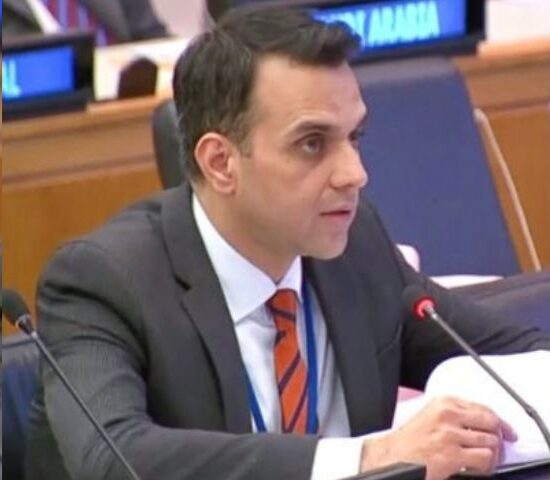UNITED NATIONS, Oct 31 (APP): Pakistan on Wednesday renewed its call for an end to the 32-year-long American economic embargo against Cuba, as the Caribbean island nation suffers its worst economic crisis in decades marked by shortages of basic goods.
“We maintain that the imposition of unilateral economic measures is counterproductive and inconsistent with the purposes and principles of the Charter of the United Nations and international law,” Ambassador Usman Jadoon, deputy permanent representative of Pakistan to the UN, told the 193-member UN General Assembly, which overwhelmingly voted on a resolution urging the US to lift its sanctions regime on Cuba.
The resolution was approved by 187 countries and opposed only by the United States and Israel, with Moldava abstaining.
The vote came just days before the U.S. election with the Democratic presidential candidate Kamala Harris and Republican contender Donald Trump signaling little interest in changing policy.
Speaking before the vote, Ambassador Jadoon said Pakistan recognizes Cuba’s right to their own means of subsistence, especially food and medicine, adding that the extraterritorial application of domestic law, including unilateral coercive measures that affect international humanitarian law and international human rights law is inadmissible.
Aligning itself with the statements delivered on behalf of the Organization of Islamic Cooperation (OIC), Non-Aligned Movement (NAM) and the Group of 77 (developing countries), the Pakistani envoy voiced deep concern over the impact that the US economic, financial, and commercial embargo, noting the UN Secretary-General’s report that also raises similar worries.
“Such measures are counterproductive to achieving our collective goals enshrined in the 2030 Agenda for Sustainable Development,” he added.
“We believe that ending the embargo would be a significant step towards improving the quality of life for the Cuban people, and will help Cuba to advance on the path towards sustainable development,” Ambassador Jadoon added.
Though non-binding, Wednesday’s action by the General Assembly drew attention to the relative isolation of the US regarding the embargo, which was first imposed in 1960 after former leader Fidel Castro came to power following the revolution.
By the terms of today’s adopted resolution, the Assembly urged other States that have and continue to apply laws or measures in support of the blockade on Cuba to repeal or invalidate them as soon as possible.
“How long will this go on?” Bruno Rodriguez Parrilla, Cuba’s Minister for Foreign Affairs, asked the Assembly, recalling that the body has urged for an end to the blockade since 1992.
“Let Cuba live; let Cuba live in peace,” he emphasized, calling the blockade “a flagrant, massive and systematic violation of the human rights of our people” and “the most encompassing, comprehensive and longest-standing system of unilateral coercive measures ever applied against any country”.
Parrilla recalled how from 18 to 23 October Cuban families had no electricity, except for maybe a few hours. “Many Cuban families lacked running water; hospitals worked under emergency conditions, schools and universities suspended their classes; [and] businesses interrupted their activity,” he said.
Since 2019, the United States has adopted harsher measures of “economic warfare” designed to prevent the supply of fuel and spare parts needed to maintain Cuba’s power plants and electric grid. “President Joseph Biden’s administration tends to claim that its policy is to help and support the Cuban people,” he said, also asking: “Who would believe such an assertion?”
The damage done to Cuba since the blockade was imposed some 62 years ago amounts to $1.499 trillion, considering the United States dollar value against the gold price, he said. During the last 18 years of the blockade, Cuba has lost $252 trillion.
“Imperialism is warning the whole world that any nation daring to firmly defend its sovereignty and to build its own future will pay a price for that rebelliousness,” he added.
“The right to food is a human right,” the foreign minister went on to say, adding that the accumulated cost of four months of economic blockade is equivalent to $1.6 billion.
That amount would be enough to guarantee for an entire year the “delivery to all Cuban families a ration food basket”, he said. With $12 million, Cuba could buy the insulin necessary to treat all its diabetic patients. The losses incurred by the blockade within a single day exceed that amount. “The United States government is perfectly aware of the direct and indirect impact that its policy has on the Cuban health system,” and the “consequences of incomplete treatments, delayed treatments and postponed surgeries,” he said.
Countering that, the United States representative, Paul Folmsbee, explaining his vote against the resolution, said: “The United States stands with the Cuban people”.
He did not challenge the view that sanctions were undermining Cuba’s economy but said they were aimed at promoting “human rights and democracy” and that the U.S. made exceptions for humanitarian purposes.

